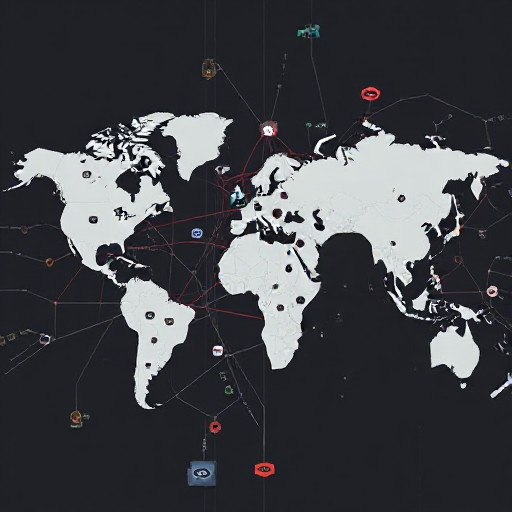
Espionage has shaped global politics, military strategy, and economic affairs for centuries. From Cold War spy games to modern-day cyber espionage threats, intelligence agencies operate in the shadows, gathering classified information, influencing foreign policies, and protecting—or undermining—national security.
Today, international intelligence agencies use a mix of covert surveillance techniques, spy recruitment strategies, and undercover operations to monitor enemies, neutralize threats, and expand their geopolitical influence. This article uncovers six key ways espionage networks operate in the shadows, revealing the hidden world of intelligence gathering and covert actions.
1. Covert Surveillance Techniques: Watching Without Being Seen
Surveillance is the backbone of espionage, enabling intelligence agencies to track individuals, intercept communications, and gather critical information. Covert surveillance techniques have evolved from old-school stakeouts to sophisticated digital monitoring systems.
Methods of covert surveillance:
- Electronic Wiretapping: Intelligence agencies tap into phone calls, emails, and encrypted messages using advanced signal interception tools.
- Hidden Microphones & Cameras: Small, undetectable devices are placed in hotel rooms, offices, and diplomatic buildings to gather intelligence.
- Satellite & Drone Surveillance: Satellites and unmanned aerial vehicles (UAVs) provide real-time monitoring of targets worldwide.
- Social Media Monitoring: Agencies analyze digital footprints to track individuals, influence public opinion, and detect threats.
Governments and corporations often collaborate to implement mass surveillance programs, blurring the lines between national security and privacy violations.

2. Spy Recruitment Strategies: Turning Insiders into Assets
A well-placed spy can be more valuable than any technology. Intelligence agencies use spy recruitment strategies to turn individuals into informants, operatives, or double agents.
How spies are recruited:
- Blackmail & Coercion: Agencies exploit personal secrets or legal vulnerabilities to force cooperation.
- Ideological Persuasion: Some individuals are recruited based on political, religious, or ideological beliefs.
- Financial Incentives: Large sums of money, offshore accounts, or luxurious lifestyles are offered in exchange for classified information.
- False Flags: Recruits may believe they are working for a different country or cause, unaware of their real employers.
High-value assets include government officials, military officers, and corporate executives with access to sensitive information.
3. Cyber Espionage Threats: Hacking the Modern Battlefield
In the digital age, hacking has become a critical tool for espionage. Cyber espionage threats allow intelligence agencies to infiltrate enemy systems, steal classified data, and disrupt critical infrastructure.
Cyber espionage tactics:
- Phishing Attacks: Fake emails and websites trick targets into revealing login credentials or downloading malware.
- Advanced Persistent Threats (APTs): Long-term infiltration of networks using undetectable spyware.
- Zero-Day Exploits: Hackers exploit software vulnerabilities before they are discovered or patched.
- Deepfake & Disinformation Attacks: AI-generated content is used to manipulate political events or damage reputations.
Countries like the U.S., China, Russia, and Israel have dedicated cyber units that engage in digital warfare, often targeting financial institutions, defense contractors, and government agencies.

4. Undercover Operations: Spies Hiding in Plain Sight
Undercover operations involve placing intelligence agents inside enemy organizations, terrorist cells, or rival governments. These operatives blend into their surroundings, gaining trust while secretly collecting intelligence.
Types of undercover operatives:
- Non-Official Cover (NOC) Agents: Operatives who pose as business executives, journalists, or academics without any official diplomatic protection.
- Sleeper Agents: Spies who integrate into foreign societies for years before being activated.
- Deep Cover Agents: Operatives with entirely fabricated identities, designed to withstand extreme scrutiny.
- Corporate Espionage Agents: Spies who infiltrate companies to steal trade secrets or manipulate markets.
Undercover operatives must maintain extreme discipline to avoid detection, as exposure could lead to imprisonment—or worse.
5. International Intelligence Agencies: Global Espionage Alliances
While intelligence agencies often compete, they also collaborate through secret alliances and information-sharing agreements. The world’s most powerful international intelligence agencies form networks that transcend national borders.
Key intelligence alliances:
- Five Eyes (FVEY): A global surveillance partnership between the U.S., U.K., Canada, Australia, and New Zealand.
- The Moscow-Beijing Axis: Russia and China share cyber intelligence and counterintelligence strategies.
- NATO Intelligence Fusion Center: Western allies coordinate military intelligence efforts.
- Interpol & Counterterrorism Networks: Law enforcement agencies share intelligence on global crime and terror threats.
Despite these alliances, espionage between “friendly” nations remains common, as governments always seek an upper hand in economic and military affairs.

6. Black Budget Projects: Financing Covert Operations
Funding espionage operations requires secrecy, leading many intelligence agencies to rely on black budget projects—classified financial allocations hidden from public scrutiny.
How intelligence agencies fund covert missions:
- Untraceable Offshore Accounts: Money is funneled through shell companies and tax havens.
- Drug Trafficking & Arms Sales: Some agencies have been accused of using illicit trade to finance black ops.
- Front Companies: Fake businesses serve as cover for intelligence-gathering activities.
- Classified Defense Contracts: Portions of national defense budgets are secretly redirected to espionage efforts.
Black budgets ensure intelligence agencies operate independently, with little oversight from elected officials or the public.
Conclusion
Espionage remains a shadowy and powerful force in global affairs, shaping wars, economies, and political landscapes behind the scenes. From covert surveillance techniques and spy recruitment strategies to cyber espionage threats and undercover operations, intelligence agencies operate in ways that most people never see.
As technology advances and espionage networks become more sophisticated, the battle for information dominance will only intensify. Whether for national security, corporate gain, or geopolitical control, the secret world of intelligence will continue to influence the fate of nations.
If you want to read more: CLICK HERE
